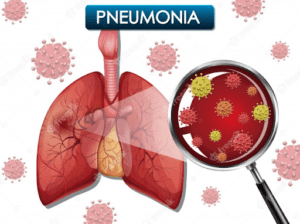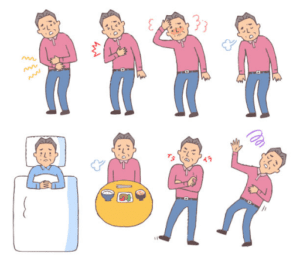Pneumonia is an infection in which your lungs’ tiny air sacs (alveoli) become inflamed. Coughing and shortness of breath are two symptoms that can occur due to this.
Pneumonia can be dangerous for some people, including the elderly.
In fact, according to a recent study, about 1 million elderly aged 65 and up are hospitalized with pneumonia in the United States each year.
It can be difficult to identify pneumonia in the elderly because its symptoms may be mild or not present at all.

Mild pneumonia, also known as “walking pneumonia,” can make elderly people feel a little “under the weather,” but it rarely requires a trip to the emergency department.
Certain pneumonia symptoms in adults, conversely, might be severe and necessitate urgent hospitalization.
So, it is important to know about pneumonia widely!
Causes of Pneumonia
Pneumonia can be caused by bacteria, viruses, or fungi, among other germs.
Well, talking about adults specifically, the most common cause is the tiny living organisms “Bacteria”.
Adults who are 65 years or older were more likely to be infected with the following terms:
- Streptococcus Pneumonia
- Haemophilus Influenzae
- Respiratory Viruses like flu and cold viruses and the COVID virus
It is very important to understand the causes of pneumonia so that you and your loved ones are safe and practice healthy habits to stay away from such infections.
- Bacteria and viruses from the nose and sinuses
- Inhaling things like expired, contaminated food, or air into your lungs
- Too much hospitalization for other treatments
- Long stay at ventilators
Prioritize Health with Our Support
What are the symptoms of different types of Pneumonia in senior citizens?
Pneumonia might be more difficult to detect in the elderly since symptoms are sometimes milder and can differ from typical pneumonia symptoms.
Older adults with pneumonia may be more likely to:

- Feel weak or unsteady, which can increase the risk of falling
- Experience confusion or delirium
- Be without fever or have a body temperature that’s lower than normal
- Degrade in functional capability and daily ability
- Lack of appetite
- Experience urinary incontinence
- Worsening of health condition
Symptoms of Bacterial Pneumonia
Symptoms of Bacterial Pneumonia can arise all of a sudden or develop gradually. The symptoms are:
- High-temperature fevers, like 105°F
- Sweating
- Increased Breathing and Pulse Rate
- Bluish lips and Nailbeds
- Confusion
Symptoms of Viral Pneumonia
Viral Pneumonia symptoms develop over several days. The symptom includes:
- Fever
- Dry cough
- Headache
- Muscle pain and weakness
Symptoms worsen in a day or two and the elderly may experience:
- Increased coughing
- Shortness of breath
- Muscle pain
- High fever
- Blue lips
5 Common Symptoms of Any Variant of Pneumonia in Elderly
Cough

Coughing is a symptom of pneumonia, however, it’s usually a productive cough that throws up green or yellow mucus-like phlegm or pus due to the fluid in the airway.
Coughing sputum can be bloody as well.
Coughing isn’t a symptom of pneumonia in every case. This is particularly the case for senior citizens who are underweight or unable to cough.
Weakness and Confusion
Confusion is more common in seniors with pneumonia than in younger patients.
Because the lungs aren’t absorbing enough oxygen, the body as a whole, including the heart, muscles, and brain, may not be operating at full potential.
Lips, fingertips, and toes can turn blue due to the lack of oxygen, and these alarming signs are a symptom of a serious infection.
Fever and Chills
Fever is common in people who have pneumonia. People over 65 with a weakened immune system, on the other hand, are more likely to have a cooler body temperature than a fever.
According to the Mayo Clinic, in the elderly over the age of 65, pneumonia can also result in an abnormally low body temperature.
Fever and chills may also be a problem, so caregivers should keep an eye out for fevers that suddenly jump after an illness that appeared to be improving.
Chest Pain
Chest pain is a typical symptom of pneumonia, and it may be more noticeable in the elderly who are unable to cough.
Pain is often so severe that prescription pain medicine is included in a senior’s pneumonia treatment plan.
A patient feels a sharp stabbing pain in the chest while breathing and coughing due to infection in the lungs and rapid growth of pneumonia bacteria in the body.
Shortness of Breath
The air sacs in the lungs might fill with fluid or pus. This results in a cough as well as breathing difficulties. When elders need to move rapidly, they will face difficulties in breathing.
For instance, rushing to answer the phone or mounting the stairs.
You may have seen, the elderly struggle to get the proper amount of oxygen when they climb upstairs or do any hazardous work.
You may hear a wheezing sound as they breathe in and out, this can be one of the symptoms of pneumonia with shortness of breath.
Pneumonia Prevention
For the elderly you can follow the given prevention tips to prevent pneumonia:
- Get the pneumococcal vaccine
- Get the influenza vaccine every year
- Wash your hands regularly
- Practice healthy lifestyle
- Avoid smoking
- Keep your home clean and sanitized
Comprehensive Care Starts Here
Pneumonia Treatment
The treatment for pneumonia is determined by the cause. The purpose is to eradicate the infection, avoid any consequences, and treat symptoms to reduce difficulties in elderly people.
In most cases, people can take care of Pneumonia at home when they have mild symptoms by following ways:
- Taking aspirin to help reduce a fever
- Drinking plenty of fluids, both cold and warm
- Use a humidifier or take a hot bath
- Avoiding smoking and second-hand smoke
- Getting plenty of rest
We recommend you visit doctors and not take any cough medicines without a doctor’s prescription.
A doctor will prescribe antibiotics if the cause is bacterial pneumonia.
Even if they feel better, people must finish the entire course of antibiotics because stopping too soon could re-infect them.

Antibiotics have little effect on viral pneumonia. The doctor may prescribe antiviral treatment if your elderly relative’s pneumonia is caused by a virus.
In some circumstances, however, all that is required is rest and medication to ease the symptoms.
If elderly people are admitted to the hospital with pneumonia, they may require oxygen therapy and an intravenous (IV) drip to receive fluids.
When symptoms get worse like bluish lips and nails, abnormal body temperature, uncontrolled coughing, trouble breathing, confusion, and delirium. We urge you to take medical help as soon as possible as worsening conditions put the life of the elderly at risk.
Final Thoughts
Pneumonia is an infection of the lungs that can be caused by viruses, bacteria, or fungi.
Adults over the age of 65 are more likely to suffer serious pneumonia complications.
If a person or an older adult feels they have pneumonia, they should get medical care right away.
Early detection of symptoms of pneumonia in the elderly and their treatment increases the likelihood of recovery and lowers the risk of complications.
References:
https://www.healthline.com/health/bacterial-pneumonia
https://www.mayoclinic.org/diseases-conditions/pneumonia/symptoms-causes/syc-20354204
https://www.newhealthadvisor.org/
https://my.clevelandclinic.org/health/diseases/15744-pneumonia-atypical-walking-pneumonia



